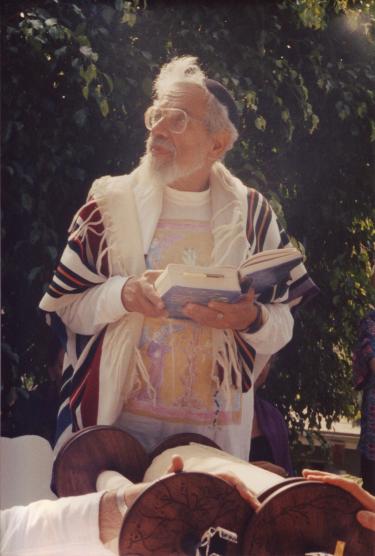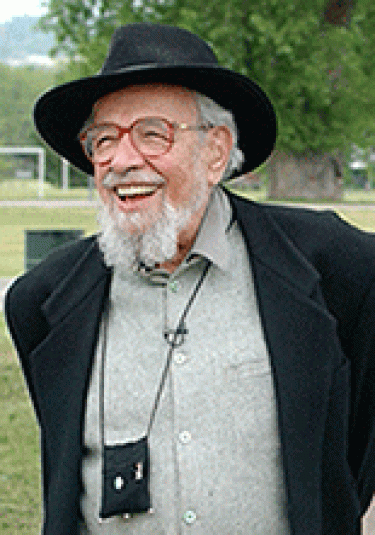Zalman M. Schachter-Shalomi Papers

Rabbi Zalman Schachter-Shalomi (1924 - 2014) is considered one of the most significant Jewish spiritual leaders of the 20th and 21st centuries. A Holocaust survivor initially associated with Habad-Lubavitch Hasidism, Schachter-Shalomi went on to found the Jewish Renewal and Spiritual Eldering movements. As a teacher of Hasidism and Kabbalah, he was known for his deep engagement and dialogue with leaders of other religious traditions. He also had a long career teaching Jewish mysticism and the psychology of religion at various universities.
The Zalman M. Schachter-Shalomi Papers form the core of the Jewish Renewal materials held in the Post-Holocaust American Judaism Collections at the University of Colorado. This collection includes materials related to Jewish Renewal and Jewish spiritual practice, Hasidism and Kabbalah, deep ecumenism and psychology of religion, spiritual ecology and spiritual eldering, and Schachter-Shalomi’s theory of Paradigm Shift. The materials provide insight and historical background on the Jewish Renewal movement as seen through the lens of Schachter-Shalomi.
Meshullam Zalman Ha-Kohen Schachter was born on August 17, 1924 in Zholkiev, Poland to Shlomo and Hayyah Gittel Schachter. In 1925, his family moved to Vienna, Austria, where he spent most of his childhood. His father considered himself a Belzer Hasid, a Jew who follows the school of Hasidic thought and practice associated with the line of rebbes from the town of Belz. His family was also liberal and educated Schachter in a leftist Zionist high school, where he learned secular subjects like Latin and modern Hebrew, as well as in a traditional Orthodox yeshiva, where he studied classical Jewish texts like Torah and Talmud.
In 1938, after the Nazi annexation of Austria to Germany, when Schachter was just 13 years old, his family began the long flight from Nazi oppression through Belgium, France, North Africa, and the Caribbean, until finally landing in New York City in 1941.
While in Antwerp, Belgium as a teenager, Schachter began to frequent a circle of Chabad Hasidim, a school of Hasidic thought originating in the town of Lubavitch. Schachter, enamored with this approach to Judaism, became a Chabad Hasid while in Europe. Upon arriving in New York, he enrolled in the Chabad yeshiva in New York, and in 1947, received his rabbinic ordination from the Central Lubavitch Yeshiva located in Brooklyn, New York.

Not long after Schachter's ordination, the Lubavitcher Rebbe of the time saw the need to move away from an insular Judaism that stressed internal community and instead rebuild what was destroyed in Europe during the war. He imagined doing this by spreading Chabad Hasidic Judaism far and wide through Chabad rabbis known as “emissaries.” Chabad’s first two emissaries were Schachter, then in his mid-20s, and his friend Rabbi Shlomo Carlebach, each of whom traveled to college campuses to teach young Jews in postwar America about Hasidic Judaism.
After serving as an emissary, Schachter took up a post as a congregational rabbi in Fall River, Massachusetts, followed by a position as a congregational rabbi in New Bedford, Massachusetts. By 1956, he had acquired a Master of Arts degree in the Psychology of Religion with a focus on pastoral counseling from Boston University and was ready to transition out of work as a congregational rabbi. He accepted an appointment as a Hillel rabbi at the University of Manitoba in Winnipeg, Canada as well as a teaching position in the Department of Religion at the university, which he held until 1975. During his time in Winnipeg, Schachter was instrumental in founding the Department and Clinic of Pastoral Psychology at United College (later University of Winnipeg). In 1968, Schachter earned his Doctor of Hebrew Letters (DHL) from the seminary of Reform Judaism at Hebrew Union College.
During this twenty-year span, Schachter grew increasingly interested in the spiritual ecumenism and experimentation he encountered on college campuses, an interest that estranged him from his Chabad origins. He was effectively "divorced" from the Lubavitcher Hasidim over issues relating to his controversial immersion in modern culture and other religions. Nevertheless, he continued his life’s work as an "independent" Hasid, teaching the experiential dimensions of Hasidism as one of the world's great spiritual traditions. The same year he received his DHL, while a postdoctoral fellow at Brandeis University, he was instrumental in launching the havurah movement in American Judaism when he and a small group of others formed Havurat Shalom in Somerville, MA.
The following year, inspired by his work with Havurat Shalom, Christian Trappist spirituality, and the discovery and circulation of the Dead Sea Scrolls, Schachter founded the B'nai Or Religious Fellowship with a small circle of students who wished to form an intentional spiritual community not found in existing Jewish institutions. B'nai Or ("Sons of Light") was changed to P'nai Or ("Faces of Light") in 1985 to reflect the gender equality of the burgeoning Jewish Renewal movement and eventually merged with The Shalom Center in 1993 to become ALEPH: Alliance for Jewish Renewal.
After years of cultivating his own vision of Jewish leadership, Schachter ordained his first rabbi, Daniel Siegel, in 1974. At the same time, Schachter helped found the Aquarian Minyan of Berkeley, California, the west coast anchor of a new kind of Judaism deeply immersed in hasidic spiritual tradition while simultaneously engaged with modern American ecumenism.

While laying the groundwork for this form of post-war American Judaism, Schachter began to study Sufism and meet with Sufis in California. This encounter led to his initiation as a Sheikh in the Sufi Order of Hazrat Inayat Khan in 1975. That year he also became professor of Jewish Mysticism and Psychology of Religion at Temple University, where he stayed until his early retirement in 1987. In 1980, as some denominations of American Judaism began entertaining the idea of opening the rabbinate to women, Schachter and two others ordained one of the early influential women rabbis, Rabbi Lynn Gottlieb.
As Schachter, who added the name Shalomi (based on the word shalom or peace in Hebrew) as a way of signaling his desire for ‘peace’ in Israel and around the world, turned sixty, he began feeling his body aging. In 1985, Schachter-Shalomi took a forty-day retreat at the Lama Foundation in New Mexico and emerged with a new teaching that became the foundation of his book From Age-ing to Sage-ing and the catalyst for the Spiritual Eldering movement, anchored by the Spiritual Eldering Institute. The Spiritual Eldering Institute Records are also held within the Post-Holocaust American Judaism Collections at the University of Colorado Boulder.
In 1995, eight years after his formal retirement from Temple University, Schachter moved to Boulder, Colorado and accepted the World Wisdom Chair at the Naropa Institute (later Naropa University), where he taught contemplative Judaism and ecumenical spirituality. In 2004, Schachter retired from Naropa University. That year, he co-founded The Desert Fellowship of the Message, the Sufi-Hasidic, Inayati-Maimuni Order with Netanel Miles-Yepez, which combined the Jewish Hasidic and Islamic Sufi traditions.
Rabbi Zalman Schachter-Shalomi passed away peacefully on July 3, 2014 at the age of 89.
The Zalman M. Schachter-Shalomi Papers include research and writings from his time as both a student and a teacher, documents relating to organizations and projects with which he was involved or founded, ephemera from events and workshops, photographs, and a variety of audio/visual media that contain homiletic, conversational, and academic content.
Among other subjects, the various of media in the Zalman M. Schachter-Shalomi Papers contain discussions and resources related to meditation, davvenology, ecumenism, Hasidism, holy days, Jewish music, Jewish mysticism (Kabbalah), psycho-halakhah, theology, spiritual eldering, and the psychology of religion.
Gift of Rabbi Zalman M. Schachter-Shalomi in 2010 with various accruals through 2013. Accruals have been overseen by Netanel Miles-Yepez, Schachter-Shalomi's representative.


